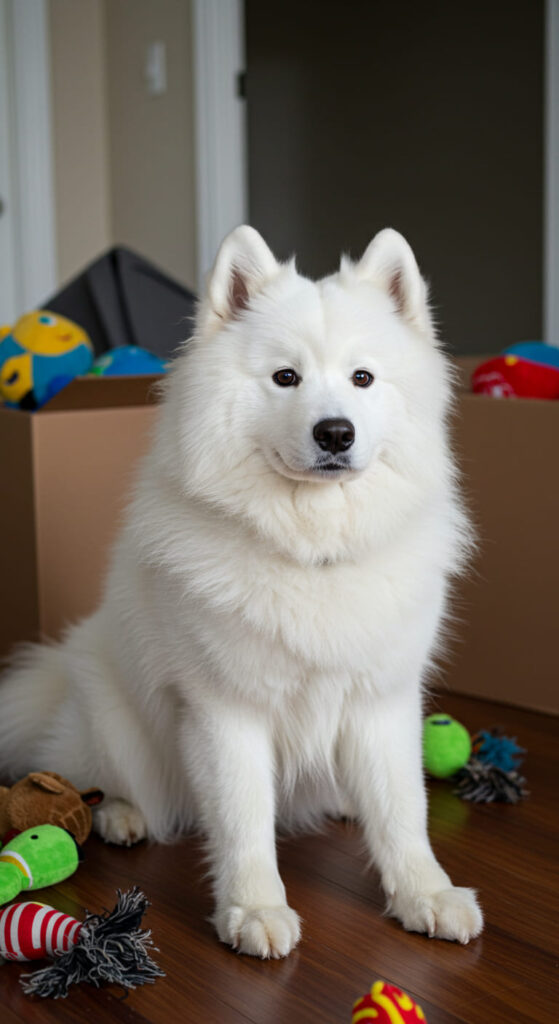When considering a Samoyed, it’s essential to look beyond their friendly appearance. These dogs come with high energy levels and stubbornness, which can pose challenges for owners. Separation anxiety and a strong prey drive further complicate their behavior. Understanding these aspects is vital for potential owners. What lies beneath their fluffy exterior may surprise you, revealing reasons that challenge the common perception of their sociability.
High Energy Levels

High energy levels can be a double-edged sword for Samoyed owners.
Their exercise requirements are significant, often demanding at least an hour of vigorous activity daily.
Without an adequate energy outlet, you might find your Samoyed exhibiting undesirable behaviors, like chewing or excessive barking.
Understanding this need for regular exercise is essential to ensuring a well-adjusted, content companion.
Stubbornness

Many owners find that the same energy that fuels a Samoyed’s playful spirit can also contribute to its stubbornness. This trait often emerges when you lack training consistency.
Without firm, clear commands and proper behavioral reinforcement, your efforts to train your Samoyed may falter. It’s essential to maintain a consistent approach to guarantee your Samoyed responds positively and learns effectively.
Separation Anxiety

While Samoyeds are often celebrated for their affable demeanor, they can be prone to separation anxiety, which complicates their overall temperament.
You might notice anxiety signs, such as excessive barking or destructive behavior, when you leave them alone.
Implementing separation techniques, like gradual alone time or engaging toys, can help ease their distress, fostering a healthier emotional state for both you and your Samoyed.
Strong Prey Drive

When you bring a Samoyed into your home, it’s important to recognize their strong prey drive, which can greatly impact their behavior and training.
This instinct often leads them to chase small animals, requiring additional training to manage effectively. Understanding these behavioral instincts helps you strategize better, ensuring your Samoyed’s natural tendencies don’t lead to unwanted situations or difficulties in your living environment.
Need for Socialization

Understanding a Samoyed’s strong prey drive also brings to light their need for socialization. Proper social skills can greatly influence their behavior with other animals and people.
Early exposure to various environments, sounds, and other dogs promotes adaptability and reduces fear-based reactions. Without adequate socialization, Samoyeds may develop aloofness, leaving you with challenges in forming a trusting relationship.
Natural Guarding Instinct

The Samoyed’s natural guarding instinct can be surprising to those who expect them to be purely friendly companions.
Their instinctive protection manifests through guarding behavior, which can be particularly pronounced around family and territory.
This characteristic, often overlooked, reflects their historical roles as both companions and protectors, highlighting that their warmth doesn’t exclude a capacity for vigilance when it comes to potential threats.
Independent Nature

Although many people believe Samoyeds are simply affectionate, their independent nature can challenge this perception. You might notice their independent behavior, which stems from instinctual tendencies rooted in their history as working dogs.
This can lead to moments of aloofness, where they prioritize their own exploration or decision-making over seeking affection. Understanding this aspect is key to comprehending their true social dynamics.
Grooming Requirements

Grooming a Samoyed requires more than just the occasional brush; it’s a significant commitment due to their thick, double coat that sheds year-round.
You’ll need proper grooming tools like slicker brushes and undercoat rakes for effective coat maintenance.
Regular brushing prevents matting and reduces shedding in your home, ensuring your Samoyed stays healthy and comfortable while maintaining an appealing appearance.
Not Ideal for First-Time Owners

Owning a Samoyed can be a rewarding experience, but these dogs aren’t always the best choice for first-time owners. They present first-time challenges, such as their independent nature, which can lead to training difficulties.
Without prior experience, you might struggle to establish consistent discipline and socialization. Understanding these issues is essential to ensuring a happy relationship between you and your Samoyed.
Noise Sensitivity

As you consider welcoming a Samoyed into your home, it’s important to recognize their sensitivity to noise.
Samoyeds can react strongly to various noise triggers, whether it’s thunder, fireworks, or loud household sounds. They often display sensitivity cues, such as whining or hiding, indicating their distress.
Understanding and managing these sensitivities is vital for creating a comfortable environment for both you and your new dog.
Adaptability Challenges

While many dog breeds quickly adapt to new environments and situations, Samoyeds sometimes struggle with adaptability challenges that can impact their behavior and overall well-being.
Environmental factors, such as changes in routine or unfamiliar surroundings, may exacerbate these issues. Additionally, breed misconceptions—believing they’re inherently friendly—can lead to unrealistic expectations, further highlighting the need for a deeper understanding of their specific adaptability requirements.
Potential for Destructive Behavior

Many Samoyeds exhibit a potential for destructive behavior, particularly when they’re bored or anxious.
This can manifest as destructive chewing or damaging digging habits, which can result in ruined furniture or an uprooted garden.
Understanding this tendency is crucial for owners, as providing adequate mental and physical stimulation can help mitigate these behaviors, leading to a healthier, happier dog.
Limited Tolerance for Heat

Although Samoyeds are known for their thick, fluffy coats, they actually have a limited tolerance for heat. Their heat sensitivity makes them struggle in warmer climates, which can lead to discomfort and even heat-related health issues.
As a breed, they prefer cooler temperatures, so understanding their climate preference is essential for ensuring their well-being and maintaining a happy, healthy environment.
Health Issues Affecting Behavior

Health issues can greatly influence a Samoyed’s behavior, often causing changes in temperament or social interactions.
Certain health conditions, like hip dysplasia or thyroid problems, may lead to discomfort and irritability, resulting in behavioral issues such as aggression or anxiety.
Recognizing these links is essential for responsible ownership, helping you provide the best care and support for your Samoyed’s emotional and physical well-being.
Misunderstood Communication Signals

Behavioral issues can sometimes stem from health problems, but communication is another key factor in a Samoyed’s temperament.
Many owners misinterpret their dog’s body language, leading to miscommunication methods. For instance, a wagging tail may not always indicate friendliness; it can signal excitement or anxiety.
Understanding these signals helps bridge the gap and fosters a healthier relationship between you and your Samoyed.